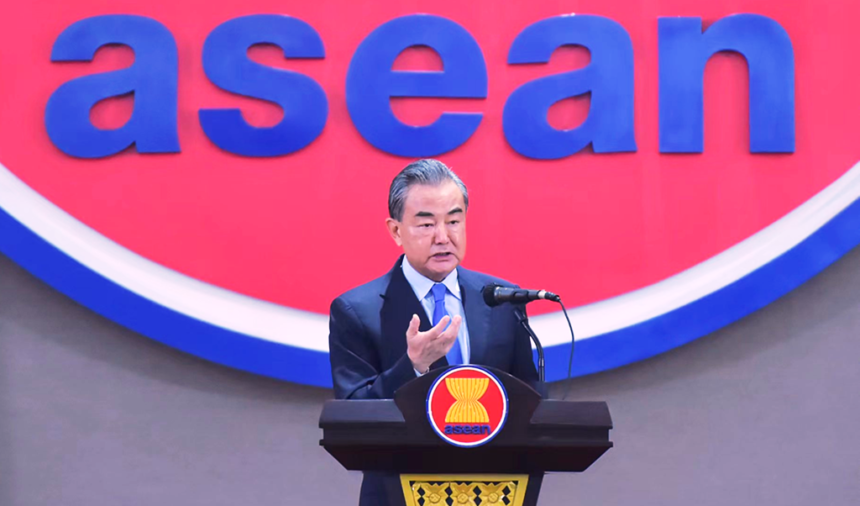Chin’s Foreign Minister Wang Yi urged ASEAN countries on Friday to take firm action against online gambling and scam gangs. He called on these nations to take responsibility in addressing the issue.
Wang highlighted several cases of online gambling and telecom scams near the Thai-Myanmar border, stating they have endangered citizens of China and other nations. The remarks were shared in a statement released by China’s foreign ministry.
During an unusual meeting with regional diplomats, Wang expressed China’s willingness to work closely with ASEAN countries on law enforcement and security. He emphasized the need to ensure safe travel for people from all countries.
China’s push for stronger security collaboration reflects Beijing’s growing alarm over rising telecom fraud and human trafficking in Southeast Asia. It also signals a renewed effort to coordinate with the 10-member ASEAN bloc, which includes Myanmar and Thailand, to combat cross-border crimes.
Before the COVID-19 pandemic, Chinese tourists were a major source of income for Southeast Asian economies, spending billions annually. However, growing fears about trafficking and reports on Chinese social media of tourists being targeted by criminal gangs could deter future visitors.
In a recent high-profile incident, a Chinese actor who went missing near the Thai-Myanmar border was found in Myanmar. Thai police believe he fell victim to human trafficking.
China’s public security ministry revealed that overseas fraud rings had lured Chinese citizens with promises of lucrative jobs, free meals, housing, and paid travel. According to state media outlet CCTV, victims are then forced to work in telecom scam operations in places like Myawaddy, a town on the Myanmar-Thailand border.
Meanwhile, Thai officials discussed the issue during a cabinet meeting on Monday. They pledged to “accelerate efforts to address problems harming Thailand’s reputation as a safe tourist destination,” as China’s Xinhua news agency reported.
Prime Minister Under Pressure
Prime Minister Paetongtarn Shinawatra is facing calls from local politicians to address the issue of a scam operation in neighbouring Myanmar. The issue gained attention after Chinese celebrity Wang Xing became entangled in a controversial case.
International pressure is also growing, urging the Thai government to take action, as thousands of individuals from 21 nations remain trapped in Myanmar.
The Thai border town of Mae Sot came back into focus in early 2025 after Wang vanished on January 3. Reports say he was lured through a job offer on the WeChat app for an acting gig in Thailand. The 31-year-old actor, Xing Xing, was rescued on January 7 from a scam operation in Myanmar near Mae Sot.
Media outlets reported that Wang was detained for illegally entering Myanmar, an area controlled by the Karen National Army (KNA). He was later handed over to Thai authorities. Speaking to reporters, Wang described how he realized things were suspicious. Instead of working on a film project, he had a shaved head and was forced into training for fraudulent phone scams.
Paetongtarn assured the public that her administration would address the incident carefully to avoid damaging the country’s tourism image. “Rumors online are painting Thailand as unsafe. We are carefully managing the situation,” she said. She also tasked the Ministry of Digital Economy and Society with countering false information online.
The prime minister added that she instructed the foreign ministry to work with China and other countries on cybersecurity and technology safety.
Scams on the Border
Wang reportedly crossed the border from Mae Kon Ken village in Mae Sot to a casino managed by a Chinese group linked to the notorious scam hub KK Park. Authorities later found he had been taken to another scam city, Taizhang, near Thailand’s Phop Phra district.
Studies by researchers and organizations highlight that these scam hubs, often called “call centers,” are growing along the Myanmar-Thailand border, especially in Karen State. Victims are trafficked and forced to carry out cybercrime schemes for extended periods.
The area is home to multiple scam centres, including Shwe Kokko, known for its involvement in online fraud, human trafficking, money laundering, and arms trading. This hub, which surfaced in 2019, had to relocate in 2023 after pressure from Chinese authorities and a power shutdown by Thailand.
Another major site, KK Park in Myawaddy, operates similarly, exploiting workers to run online scams targeting foreign victims. Taizhang or Tha Chang, a newer hub, is about 50 kilometres from Myawaddy near Tak province. Its operations are led by Chinese nationals with backing from the Karen National Army.
Human rights groups report that over 6,000 individuals from 21 countries remain trapped in these operations. Among them are 3,900 Chinese nationals suffering severe abuse. Families are often forced to pay large ransoms for their release.
On January 9, representatives from nine countries, including Kenya, Bangladesh, and the Philippines, submitted an online letter to Thailand’s National Human Rights Commission. They called for immediate action to rescue trafficking victims.
A Bangladeshi representative emphasized Thailand’s key role in addressing the crisis. “Since the area is closer to Thailand, authorities should monitor cross-border movement more closely to save lives,” they said. They also suggested that Thai officials negotiate with the BGF (Border Guard Force), as these groups depend on Thailand for logistics.
The Government’s Response
Rangsiman Rome, an MP from the opposition People’s Party, called for the scam centre issue to be prioritized on the national agenda. “This is not just another country’s problem—ours too. Thailand has long been a gateway for these operations,” he said.
Rangsiman criticized the lack of action, highlighting the growing number of scam centres. “The number of identified sites has increased from 35 to 40. There are now 75 sites nationwide: 40 in Myanmar, 5 in Laos, and 30 in Cambodia. This has become a massive industry, yet no clear strategy exists to combat it,” he stated.
During a House of Representatives meeting on January 8, Rangsiman invited officials from various agencies to provide updates but said little progress was shared. He urged stronger efforts to address the underlying issues enabling these operations to thrive.
Related News:
Thailand Extradites MBI Group CEO to China Over $14 Billion Crypto Scam

Geoff Thomas is an award winning journalist known for his sharp insights and no-nonsense reporting style. Over the years he has worked for Reuters and the Canadian Press covering everything from political scandals to human interest stories. He brings a clear and direct approach to his work.














